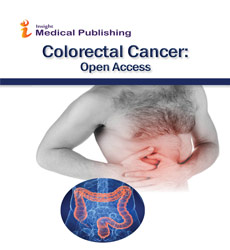Contribution of Insulin to Colon Carcinogenesis
Randolph M
Randolph M
Division of Colon and Rectal Surgery, Department of Surgery,Mount Sinai Medical Center, One Gustave L. Levy Place, New York, USA. E-mail: randolph.steinhagen@mountsinai.org
A colon cancer diagnosis can be terrifying. One of the first questions that patients usually ask is “what’s next?” The plan for treatment depends on a number of factors. Determining the best course of action is affected by your general health, whether or not the cancer is a recurrence of a cancer that was treated in the past, and on the stage of the cancer.
Cancer staging takes place after the initial diagnosis and may involve a number of tests. Each test will help your physician to determine how much of your body the cancer has affected. After determining the stage, your physician will recommend a course of treatment.
Colorectal cancer is a common malignancy worldwide. Despite significant developments in the treatment of this disease, it still causes considerable morbidity and mortality. Recent advances include both newer cytotoxic chemotherapies and novel biologic agents. Although overall progress has been more modest than had been hoped, substantial benefits have been achieved for some patients, and the number of treatment options has substantially increased. Perhaps most importantly, treatment regimens can now be selected and tailored toward the individual patient following an informed discussion between the patient and the treating oncologist. We present in detail these recent advances and provide some insight into several promising future strategies.
The insulin resistance-colon cancer hypothesis, stating that insulin resistance may be associated with the development of colorectal cancer, represents a significant advance in colon cancer, as it emphasizes the potential for this cancer to become a modifiable disease. The fact that the incidence of insulin resistance has been increasing in the United States and much of the rest of the Western world where colon cancer remains the second leading cause of cancer death makes the exploration of the interrelationship of these conditions a subject of high priority. Here, we review the salient features of insulin resistance, defined as impaired biological response to the action of insulin. Recent epidemiological studies, evaluating potential associations between colon cancer risk and diabetes mellitus, dietary intake and metabolic factors, and IGF levels in several clinical settings, provide strong support of the insulin resistance-colon cancer hypothesis (without establishing causality). Mechanistically, insulin resistance has been associated with hyperinsulinemia, increased levels of growth factors including IGF-1, and alterations in NF-κB and peroxisome proliferator-activated receptor signaling, which may promote colon cancer through their effects on colonocyte kinetics. It is a reasonable expectation that in the not too distant future, critical interventions to the already mapped molecular sequence of events, which link two apparently disparate entities, combined with lifestyle changes could abrogate the development of colon cancer.
Open Access Journals
- Aquaculture & Veterinary Science
- Chemistry & Chemical Sciences
- Clinical Sciences
- Engineering
- General Science
- Genetics & Molecular Biology
- Health Care & Nursing
- Immunology & Microbiology
- Materials Science
- Mathematics & Physics
- Medical Sciences
- Neurology & Psychiatry
- Oncology & Cancer Science
- Pharmaceutical Sciences
